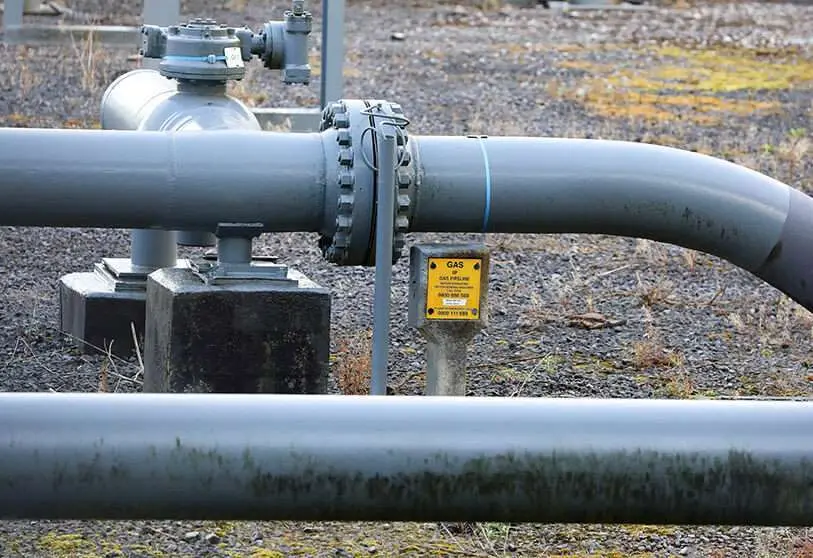Scholz and Sánchez team up to get Macron to agree to gas pipeline with Spain

The German Chancellor, Olaf Scholz, and the Spanish Prime Minister, Pedro Sánchez, on Tuesday made a common front to get the French President, Emmanuel Macron, to agree to promote the gas interconnection between his country and Spain through the Pyrenees.
Scholz invited Sánchez to take part in an extraordinary meeting of his government in Meseberg, some 70 kilometres from Berlin, where they will spend two days analysing issues such as security strategy and other challenges arising from the war in Ukraine, such as the need to guarantee energy supply.
These supply problems and possible solutions were present both in the meeting between the head of the Spanish government and all the German ministers and in the subsequent meeting with Scholz.
Faced with the difficulties resulting from Russia's invasion of Ukraine, the chancellor publicly demanded days ago that Spain's gas interconnection with France via the Pyrenees (the so-called MidCat) be promoted, and on Tuesday he ratified his "full support" to Sánchez.
A full endorsement but assuming that it is a "long-term" solution.
For him, we must take advantage of the possibilities that exist in Europe to deal with the situation, and he said that Spain and Portugal are countries capable of producing a very significant energy surplus.
"This is the great task, the creation of a large European network (...) and we want to do everything possible to achieve it", he added.
PENDING OBJECTIVE
Sánchez thanked his German counterpart for his support and recalled that his first official act as president was a meeting in Lisbon in which, among others, the then EU Commissioner for Energy, Miguel Arias Cañete, the French President, Emmanuel Macron, and the Portuguese Prime Minister, Antonio Costa, were present.
He pointed out that at that summit they had already discussed the need to speed up electricity and gas interconnections, the latter compatible with green hydrogen.
"The objectives have not been met," regretted Sánchez, who pointed out that the Iberian Peninsula's energy interconnections with the European energy market now stand at less than 3%, a far cry from the commitments made at the time.
He therefore insisted that he was grateful to Scholz for supporting the need to speed up these interconnections.
However, he warned that if this project is not promoted, there is an alternative that the European Commission is also considering, which involves connecting Spain with Italy via the Mediterranean.
In any case, he wanted to make clear Spain's full support and solidarity with the European countries that, like Germany, are suffering most from the "energy blackmail" of the Russian President, Vladimir Putin.
In this context, he recalled that Spain has 30% of the regasification possibilities in Europe and cannot take advantage of its full potential due to the "bottleneck" with France.
"This is what we have to resolve, whether it is through France or Italy. But Spain is ready to show solidarity and respond to the call of our friends and brothers like Germany, which is suffering from Putin's unacceptable blackmail".
STRUCTURAL REFORM
Sánchez's visit to Germany came a day after the President of the European Commission, Ursula von der Leyen, announced an "emergency intervention" and a structural reform of the electricity market in the face of its exorbitant price increases.
The Spanish government has expressed its satisfaction that Europe is finally taking on board a proposal that Sánchez has been calling for for a year.
For its part, Scholz's coalition, a tripartite of Social Democrats, Greens and Liberals, is studying a medium-term reform of the energy market, according to reports last weekend, including the decoupling of gas and electricity prices, something that Germany rejected outright until a few months ago.
"Russia's war over Ukraine has precipitated the need to reflect on national and energy security," Scholz said, though without explicitly referring to the reform in the making.
Amid the energy supply issues, journalists asked the pair whether, as other leaders such as French President Emmanuel Macron and Italian Prime Minister Mario Draghi have done, they plan to travel to Algeria, a major supplier of gas to several European countries.
"I will tell him that I would love to be the one to go to Algeria," Sánchez simply said, without the German chancellor commenting on the matter.
Relations between Spain and Algeria are in crisis after the Spanish government reversed its traditional position on the Sahara, prompting Algeria to recall its ambassador to Madrid and break the Good Neighbour Treaty signed with Spain 20 years ago.
BILATERAL SUMMIT
If Sánchez described bilateral relations with Germany as "excellent", shared Scholz's ideas for reforming the European Union and said that the two countries are committed to fair growth, the chancellor assured that Spain is "a very special friend".
Sánchez referred to two meetings planned for October to deepen this relationship.
The first of these will take place on 5 and 6 October, when Spain will host a bilateral summit presided over by the two countries, and the second will come just two weeks later, a state visit by the King and Queen of Spain to Germany on 17 and 18 October.








